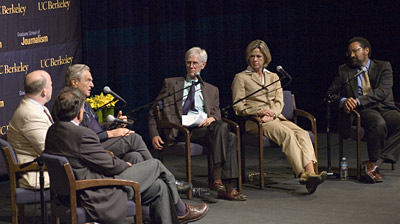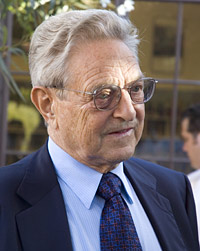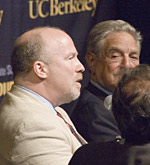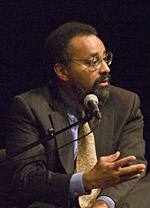UC Berkeley Web Feature
 |
George Soros speaks as (from left) Lowell Bergman, Mark Danner, Orville Schell, Dana Priest, and Christopher Edley, Jr. look on at a Sept. 19 UC Berkeley forum. (Bonnie Azab Powell photos) |
War on terror's biggest casualty is America, say George Soros, Mark Danner, others in forum
BERKELEY – What has happened to America?
The actual title of the forum that took place at a packed Zellerbach Hall on Tuesday night (Sept. 19) was "The Consequences of the War on Terrorism," one of many events held nationwide to mark the fifth anniversary of the terrorist attacks on the World Trade Center and the Pentagon. But as each of the six participants — a billionaire philanthropist, a law-school dean, and four preëminent journalists — took turns weighing in, the bleak picture painted by the responses was of a once admirable superpower that has lost its way.
|
Quotation with which journalism dean
Orville Schell began the forum: -George
Orwell, "Politics and the
English Language" (1946) |
The most damning sign: the United States has "gone from a nation that doesn't torture to one that, well, tortures when it needs to," said UC Berkeley journalism professor Mark Danner. A MacArthur Fellow, Danner is the author of the post-9/11 books "The Secret Way to War" and "Torture and Truth." Thanks to what is now essentially a one-party government, he said, the country has taken this course with no national debate. "That image of what America does — the gap between what it does or permits, and what it says it stands for — is, I think, the greatest painful consequence of the war on terror. It's going to be the wound that's will last the longest and be the most difficult to heal."
"You can't make war on a tactic"
The original wrong turn America took, agreed the participants, was in ever accepting the premise of a "war on terror."
First of all, "you can't make war on a tactic," shrugged Pulitzer Prize-winning journalist and PBS Frontline correspondent Lowell Bergman. ("It's like declaring war on air power," added Danner.) Bergman, currently the Reva and David Logan Distinguished Professor of Investigative Reporting at UC Berkeley, pointed out that the Bush administration is now terming it a war on "Islamo-fascism," a made-up term that in addition to being historically befuddling, he noted, was having an "alienating effect" on the prosperous, patriotic Muslim community in this country.
 'Mankind’s power over nature has increased cumulatively while its ability to govern itself has not kept pace. … If the United States fails to provide the right kind of leadership our civilization may destroy itself.' -George Soros, writing in "The Age of Fallibility" |
The war on terrorism as a metaphor creates a psychological gap, "a chasm, between 'us' and 'them' where we are victims and they are perpetrators," argued George Soros, whose latest book, "The Age of Fallibility: The Consequences of the War on Terrorism," formed the intellectual starting point for much of the discussion. In it, he quotes the prime minister of Macedonia as having dubbed him a "stateless statesman," because "states have interests but no principles…You have principles but no interests." Soros wrote that "I like that formulation and I try to live up to it. The world is badly in need of stateless statesmen."
Soros believes that this one-way separation of "us" from "them" not only stops Americans from recognizing that U.S. actions also shape the behavior of terrorists, but also prevents the country from dealing with them effectively. "The war on terrorism is an abstraction that lumps together different political movements that use terrorist tactics. It fails to distinguish among Hamas, Hezbollah, Al Qaeda, or the Sunni insurrection and the Mahdi militia in Iraq. Yet all these terrorist manifestations, being different, require different responses," he wrote in a recent Boston Times opinion column.
This chasm between "us" and "them" is what allowed U.S. soldiers and intelligence agents to humiliate, even torture prisoners in U.S. prisons in Iraq and Guantanamo Bay and in secret prisons in unknown locations in Eastern Europe that have come to light. Most turned out to have no valuable knowledge, Soros said, and when those "innocent" prisoners are released, as they must be eventually, America has simply created thousands more enemies.
"It's a self-reinforcing, vicious circle of escalating violence," he concluded. "Bush says [the terrorists] hate us because of what we are, not what we do, and I think that's false." He believes the war on terrorism may destroy the United States more effectively than any terrorist attack could, by destroying its values as an open society.
 'The Bush administration, for all its lack of competence in many, many areas — Iraq, Katrina, you can go through the list — has shown itself to deploy an almost virtuosic proficiency in using the war on terror politically.' -Mark Danner, UC Berkeley professor of journalism |
The Fourth Estate, agreed all the participants, has been one of the biggest casualties of the war on terrorism. A combination of decreasing resources, factual blunders, and the scalding contempt displayed by top members of the Bush Administration toward institutions such as the New York Times has greatly diluted the power of the press to fulfill its role as the public's watchdog.
One of the participants, Dana Priest, is the Washington Post investigative reporter who first broke the story that the U.S. government was moving prisoners of war — or "illegal combatants" as the government refers to them — to secret "black site" prisons in Eastern Europe and elsewhere. Priest won a 2006 Pulitzer Prize for her work. She said there had been little reaction to these revelations in Washington, where there is a distinct lack of "opposition voices." What debate there has been over these secretive, unsanctioned operations, which she called "the largest covert action since the Cold War," has come from moderate Republicans like John McCain.
The Democrats have been silent for a reason, said Danner. "The Bush administration, for all its lack of competence in many, many areas — Iraq, Katrina, you can go through the list — has shown itself to deploy an almost virtuosic proficiency in using the war on terror politically. And one of the things we've learned in five years is that when we're frightened, we're willing to do just about anything and put up with just about anything."
And now for the good news
Orville Schell, dean of UC Berkeley's Graduate School of Journalism and the evening's host, pressed the guests to find something to be optimistic about. For Bergman, it was that there have been no attacks on America since the ones five years ago. Priest offered up that Washington and the nation seem to be on the verge of at least debating what to do next, and said she is encouraged that military personnel are holding press conferences to state emphatically that they are abandoning coercive techniques because they do not yield valuable intelligence. She is also heartened by recent federal court rulings.
"Don't count on law, or the courts," shot back Christopher Edley, Jr., dean of UC Berkeley's Boalt Hall School of Law and founder of the Civil Rights Project at Harvard University. "They haven't done the hard part yet." The courts had only chastised the Bush Administration for not getting permission from Congress, he pointed out, not weighed in on the constitutionality of various White House actions.
 'We can be safe and have liberties, but the question is how safe? And which liberties?' -Christopher
Edley, Jr., dean of Boalt Hall's School of
Law |
Edley, who worked in both the Carter and Clinton Administrations, provided much of the comic relief at the Zellerbach event. He encouraged everyone to buy George Soros's new book because "it's intellectually bracing — and it's short. I mean pithy. It's rich with philosophy and geopolitics and history and finance. It could get him a tenured chair in five departments on campus — even if he didn't pay for them. So I encourage you to buy it … because he needs the cash."
When Schell lobbed Edley his first question — whether individual freedoms must be sacrificed for national security — Edley jokingly asked for a new question. His eventual answer: "Yes, we can be safe and have liberties, but the question is how safe? And which liberties?"
Danner, although he took issue with the Faustian bargain implied by Edley's statement, agreed with him that Americans should not place their trust in the courts to halt the war on terror. Recalling the Watergate trials, he observed that historically, American society has followed a pattern he characterized as "revelation, investigation, and expiation." That is, government wrongdoing is uncovered and exposed — in a front-page article on the New York Times, say — and that sparks investigation, which is followed by punishment, so that society may cleanse itself and returns to "a state of grace," or equilibrium.
But as a consequence of the war on terror, "we're stuck at that first step," Danner lamented. Many incidences have been exposed — "frozen scandals," as he dubbed them — and continue to reappear in the newspapers, but they engender no consequences. A fear-mongering, one-party government has effectively blocked investigation and as a result contended Danner, any judgment from the courts.
Danner had no hope to offer in response to Schell's "plaintive request" for optimism: not in Iraq, not in the courts, and not in the global community's ability to reign in the United States. Indeed, he chuckled with gallows humor as he quoted from the Pentagon's 2005 National Defense Strategy:
Our strength as a nation state will continue to be challenged by those who employ a strategy of the weak using international fora, judicial processes, and terrorism.
"This is a document the government puts together as a public statement," he marveled, "and they group together ... the United Nations and other international bodies with terrorism?"
Yet Soros, the one person on the stage closest to personifying the kind of international power dismissed by that document, was slightly more hopeful. He believes that America can right itself, because "We're a democracy. I think public opinion has shifted, but it has to shift more. We're close to a tipping point, that's why I'm pushing it" in his new book, and in appearances like these.
Edley offered a serious, heartfelt suggestion as to what could help tip the balance. Speaking quietly, slowly, and directly to the audience, he said:
I hope this isn't too radical an idea, but there's just a chance that a world-leading research institution with a public mission could contribute to this problem. There's just a chance that if you take a really hard question — be it opium production in Afghanistan or understanding the relationship between fundamentalist religion and international politics — just a chance that some of the best scholars and most inspired students on the face of the planet, if we bestirred ourselves to focus on these questions with an intentionality that befits our public mission, there's just a chance that we could make a contribution.
UC Berkeley, Edley went on, is one of the few institutions that has the ability — and the intellectual credibility — to tackle these issues and untangle them. Such exploration has already begun taking place around campus, and "we should probably figure out a way to do that on an even grander and more ambitious scale," he concluded.
"Consequences of the War on Terror" was sponsored by the Goldman Forum on the Press & Foreign Affairs, the Chancellor's Office, the World Affairs Council and the Graduate School of Journalism. A webcast of the event will be available soon.
Related:
"Democracy begins at home, chides billionaire philanthropist George Soros," UC Berkeley NewsCenter, March 4, 2004
Boalt Speaks About Terrorism: A collection of the Berkeley law school's events coverage and articles on the topic

